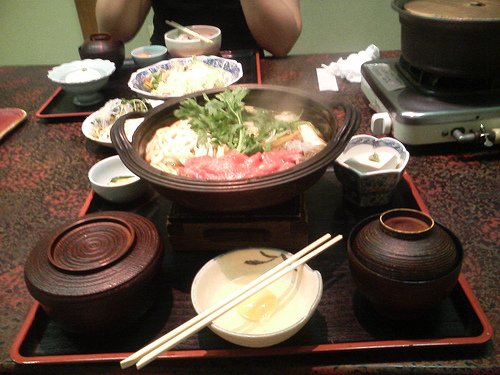Japan is numbly watching the aftermath of the sad events at Virginia Tech as they unfold. Much like Europe, it’s illegal for most people in Japan to possess guns, and as a rule real firearms are a distant part of life for Japanese. The subject of guns has come up in my English conversation classes many times over the years (“How many guns did you own when you lived in America?”), and I always did my best to present the complex issue in a way that my students could understand, which was not always easy since they don’t have a feel for our history. While incidents of gun-related violence are less common in Japan, they’re not totally unheard of, a fact that we were all reminded of when Mayor Ito of Nagasaki, an outspoken opponent of nuclear weapons, was shot in the back by an irate yakuza boss on the same day as the tragedy in Virginia. The gangster in question had managed to run his Mercedes Benz into an open ditch at a construction site several years ago and had tried to make the city take responsibility for the repairs, and his frustration finally came to a head. This isn’t the first time a Nagasaki mayor has been targeted: the city’s previous mayor was shot by a right-winger in 1990 after he made remarks blaming former Emperor Hirohito for the events the war.
You may know that Japanese, like other nations in Asia, reverse the order of the family and given names, so that the name Hayao Miyazaki in English would be Mizayaki Hayao here. Essentially, the ideas of “first name” and “last name” are useless in Japanese, replaced by the family name and namae (nah-mah-EH), or the given name, which is so close to the English word “name” that it’s spooky. Like learning to say your phone number in Japanese, it can be quite a challenge to make your brain un-learn a name memorized using one language when you need to use it in another. When you learn the name of Japanese film director Akira Kurosawa, the name takes up one gestalt part of your memory, and having to say the name in the reverse order causes your brain to do some fast calculation. Although the family name comes first with Japanese names, this rule doesn’t apply to foreigners, whose names are always used as they are in English.
Living as a gaijin in a place that’s as homogeneous as Japan brings out some interesting responses in people, and one could write a book studying the psyche of foreigners in Japan. For example, there are the “three states of eye aversion” they seem to go through when it comes to looking at other foreigners around them, not wanting to directly meet the gaze of a an unknown foreigner on the street. There are many gaijin from various countries who appear regularly on TV speaking fluent Japanese and giving an “outsiders view” on things, but foreigners living in Japan often hate these TV personalities, if for no other reason than because their Japanese is better than ours. Among the foreign-born “talents” you can see on TV here are Bobby Orogon, the bumbling Nigerian comedian who makes Japanese language mistakes on purpose to get laughs; dashing bilingual Italian Gioramo, always there to provide his views on travel shows or documentaries about the Roman Empire; and the eternal Dave Spector, the most famous American in Japan, who has his own gossip section on the morning TV news where he reports on what all the American stars are doing this week.
Remember that J-List carries all the greatest PC dating-sim games from Japan, but translated into English. With a huge catalog of games for all tastes, there’s something for everyone, whether you want games with incredibly cute characters, story-centric dramatic games, hilarious comedy dating-sims, all-ages titles or whatever. The upcoming YUME MIRU KUSURI :: A Drug That Makes You Dream has been declared Golden Master and will be shipping in a very short time. Why not preorder it for free shipping when it’s printed?















